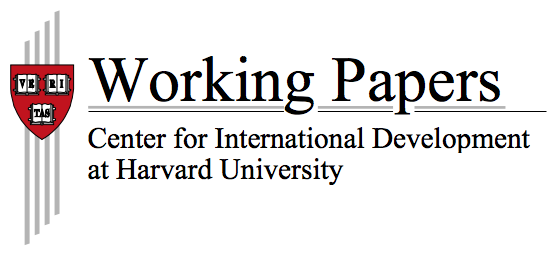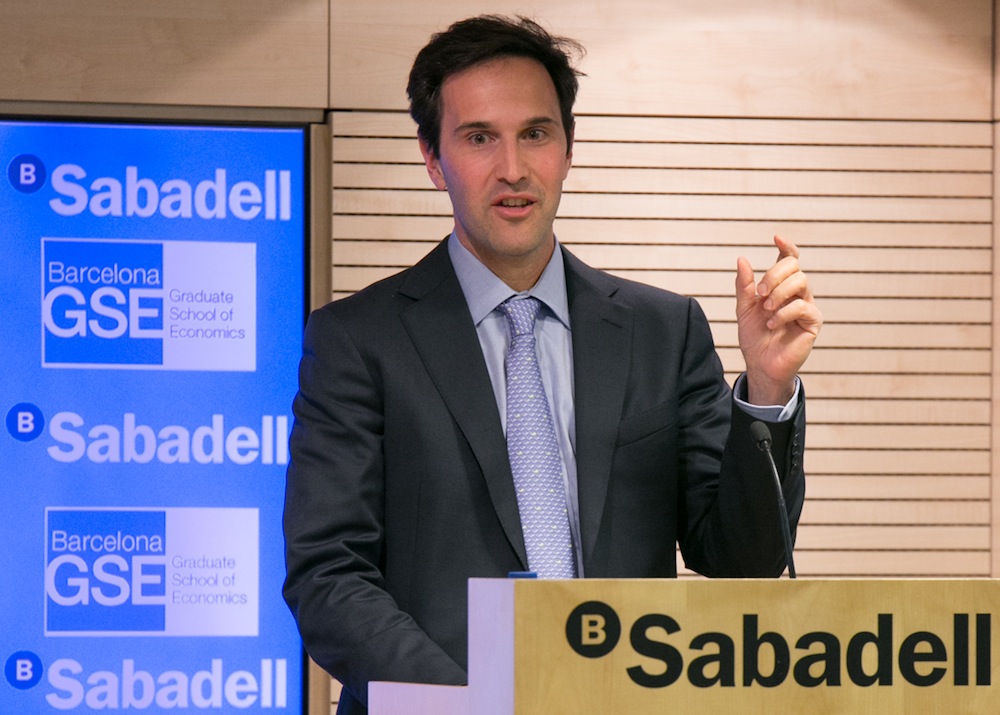
By Hugo Ferradans, current student in the Barcelona GSE Master in Economics of Public Policy. Follow him on Twitter @Hferradans.
“In my over 50 years of academic life, the 1% has never had as much influence in shaping the knowledge of economics as it does now.”
UPF Professor Vicenç Navarro, author of Podemos’ electoral program, talks about the way economics is taught today and some of the policies put forward by Podemos.
Vicenç Navarro is currently a professor and the director of the Public Policy program both in Pompeu Fabra and John Hopkins University. Being one of the most internationally cited researchers in the field of social sciences, Vicenç Navarro is an economist, political theorist and sociologist who has been widely recognized for challenging neoliberal approaches to the study of economics. Together with professor Juan Torres, he is the author of the controversial electoral program put forward by Podemos, where they advocate for a strong public sector and welfare state, as well as a move away from an economy based on speculative industries like construction. Love-him or hate-him, Navarro’s strong opinions have been able to shake the current economic academia and Spain’s political scenario – and we are here to ask him about it.
Part 1: Reflections on the way Economics is taught today
Hugo Ferradáns (HF) – There is little doubt that neoclassical economics has contributed to a very large extent to the study of economics and social sciences. Nevertheless, it seems that this neoclassical school of thought has monopolized the economic syllabus in top universities around the United States and Europe, leaving alternative economic perspectives ignored.
You suggest in a number of articles that many of the economic policies that are being implemented currently in Europe come from specific power relations within the Eurozone (European Central Bank and the IMF against anti-austerity movements in Greece, Spain, etc.). In relation to the study of economics, how does the lack of teaching about institutions and politics in the economic curriculum, as well as the lack of debate against the foundations of neoclassical theories, are limiting our understanding of today’s economic and political scene?
Vicenç Navarro (VN) – One of the major problems we encounter in the production of economic knowledge is its excessive disciplinary approach. Actually, the academic institutions are usually divided by departments based on disciplines, one of them being economics. The reality that surrounds us, however, cannot be understood following the disciplinary approach. The understanding of our realities, including the economic ones, calls for a multidisciplinary analysis, with the understandings of the historical, political and social forces that shape and determine that reality. In order to understand the current Great Recession, for example, we have to understand how power—class power, race power, gender power, national power—is produced and reproduced through political institutions, as well as social and cultural ones. In other words, we have to comprehend how power relations shape the governance of our societies, including their economies.
Modern economics is used as a way of confusing and/or ignoring the political realities that shape the economy.
The current economics, for the most part, do not do that. They specialize in branches of the tree without understanding, or even less, questioning, the nature of the forest. Moreover, they have given great emphasis to the methods, depoliticizing the realities of the economic phenomenon. Today, modern economics is used as a way of confusing and/or ignoring the political realities that shape the economy. Currently, most of the major economic problems we face are basically political.
You cannot understand, for example, the current crisis in Europe without understanding the decline of labor income, and, thus, of domestic demand; this is the result of the changing power relations—primarily class power relations—that have occurred in the last thirty years. You can also not explain the crisis without understanding the enormous influence of financial capital on the European Central Bank. To try to explain reality by referring to the working of the financial markets as a point of departure is profoundly wrong and naïve. Financial markets have very little to do with markets. It was enough for Mario Draghi, the President of the European Central Bank, to speak a sentence, to reduce the interest rates dramatically.
The absence of the study of the political and social context, determined historically, makes current economics an apologetic message for current power relations, mystifying, hiding, and/or confusing the understanding of the economic phenomena. It is not surprising, therefore, that the critical traditions within economies are completely ignored or marginalized. It is predictable that current economists did not perceive the arrival of the current recession, which is a Great Depression for millions of Europeans. Only analysts from critical traditions were able to predict it. And we did it.
HF – Many people would ask why are historical and political contexts so ignored in the economics syllabus if they are so important to understand economics. Does this rejection come from a clash of interests between economic and political powers and Universities, or was it a slow transition towards a neoclassical orthodoxy led by the academia?
VN – The current emphasis on methods and its analysis of the economic reality without looking at the political context that determines it is a consequence of changes in the power relations in our societies. The apologetic function of current economies of the current power relations explains its lack of relevance. What we have been seeing since the 80s has been the enormous growth of income derived from capital, and the decline of income from labor. This has resulted in the drastic growth of inequalities.
The influence of financial and economic institutions in the production of knowledge is enormous.
But those who derive their income from capital have enormous influence on value-generating systems, including the media and universities. This is extremely clear in the US but is happening also in the European universities. Today, the influence of financial and economic institutions in the production of knowledge is enormous. They fund research, support economic journals, and shape, to a large degree, the academic culture in the area of economics. It is very similar to what happens in medicine where the pharmaceutical industry has a major influence in shaping clinical knowledge and practice.
In my over 50 years of academic life, never has the 1% (those who derive their income from capital) had as much influence in shaping the knowledge of economics. The situation in Spain is even worse than in the US, due to the lack of public funds for economic research. The major research institutions are funded by major banks or major corporations. This explains the dominance of the neoliberal ideology in most academic forums, journals, and major media.
HF – Does this influence go beyond universities? How does this affect democracy in Europe and the United States?
VN – The influence of what now is called the 1% on society affects all institutions that reproduce information and knowledge, from the major media in a country to the university, and now including the entire educational system, starting with the schools. The expansion of the teaching of economics to the school systems in an intent to expand a vision of reality that is in accordance with conventional wisdom in a country, the wisdom shaped by the 1%, and its allied classes (which includes approximately another 10% of the population).
Part 2: Public policy in Spain
HF – Moving now to policy in Spain, we would like to talk about the role of media in democracy. The importance of and the ways to achieve a plural media independent from public institutions and economic powers has been subject of intense debate over the past years due to its relevance to democratic quality. As an example, Prat and Strömberg (2011) suggest that to achieve this plural and independent media we need to encourage financially independent outlets. McChesney and Schiller (2003), however, focus on the importance of public media as a way to insulate outlets from being controlled by corporations.
In the economic program that Podemos presented, of which you are one of the authors, you suggest that there should be a “separation by law between the property of financial groups and communication outlets, thus ensuring the independence of all media companies from the government and large corporations” (page 10). Furthermore, you mention that there should be a “legislation that provides a minimum quota of independent public media outlets”, by which “no company could take more than the 15% of the total media market” (page 10).
Many people would question these policies, arguing that independence and quality in media markets are not necessarily achieved by constraining private companies and expanding public media outlets. Many examples of private media outlets that are independent of private corporations can be given, such as The Guardian, The New York Times and even La Sexta in Spain. How would an increase in the presence of public media outlets improve the independence of media from economic and political powers in Spain? Isn’t the problem of media independence about a casta that operates both at the private and public level?
VN – Today, financial capital—primarily banks and insurance companies—have the dominant voice in the major media. In Spain this is obvious. All major media are in deep debt and are in the hands of the banks. It is because of this that Professor Juan Torres and I indicated in our economic proposals for the new party Podemos that that linkage should be discontinued, because it enormously limits the necessary ideological diversity that should exist in any democracy. Today, there is no such diversity in Spain.
But that situation is not unique in Spain. I have lived for many years in the United States, teaching at the Johns Hopkins University for over fifty years, and ideological diversity is also very limited in that country. Rarely, if ever, will you see intellectuals such as Noam Chomsky in the major media. Incidentally, I have to correct you regarding The New York Times in the US and La Sexta in Spain. The largest groups of members on the Editorial Board of the NYT are related to insurance companies and banking. This explains the hostility of that daily to the specific single-payer proposal for reforming health care in the US. This proposal, put forward by the left of the Democratic Party and the labor union would be a model of the health care system that already exists in Canada, and would eliminate private health insurance within the publicly funded system.
And La Sexta is owned by economic and financial interests that also fund some of the extreme right-wing media, like La Razon. They allow some space for the left, but always in a very limited way. They expose those critical voices because they realize that the audience increases when critical voices are allowed. But the major owner supervises the production and do not leave much space for progressive forces.
HF – The economic program of Podemos also argues that it would encourage the presence of small and medium size companies to foster employment creation.
The Economist published an article called “Supersize me” (February 21, 2015) arguing that a lack of larger firms in Spain means fewer jobs and a less resilient economy. In particular, it mentions that “bigger firms tend to be more resilient in hard times than smaller ones. In Britain, for example, large companies – those with more than 250 workers – provide almost half of all private-sector jobs, compared with just a quarter in Spain. The Círculo de Empresarios calculates that if Spain had the same mix of firms as Britain, it would have lost half a million fewer jobs since the global financial crisis.”
From this perspective, what is attractive about medium and small size firms in an economy with such high unemployment rate, and what makes big corporations not a good option to overcome the challenges that Spain is facing today? How would this influence unemployment for young people?
VN – The major economic problems existing in Spain are not the size of the enterprises. Most of the largest Spanish enterprises used to be public enterprises that were privatized and run by friends of the governing parties. Many of them are less efficient than they were when they were public. Some of the major private banks that have run into major problems have been banks that used to be public. And even public banks were forced to act as private banks. And that is one of the major problems. Private banking in Spain is far too large. Spain is the country in the European Union with the smallest public banking sector. It is also one of the countries where it is most difficult to get credit. This, and the lack of demand due to the large reduction of wages (the lowest wages in the EU) and cuts in public expenditures (the lowest public expenditure in the EU) are the causes of the recession and limited recovery.
If Spain had the same percentage of adults working in the welfare State as Sweden, it would have about four million more people working then it has now.
The greatest need in Spain to restructure the economy, changing its dependency on sectors very prone to speculation, like construction. Also, contrary to what the 1% in Spain claims, the public sector is very underdeveloped. If Spain had the same percentage of adults working in the welfare State as Sweden, it would have about four million more people working then it has now.
HF – In your opinion, then, what would you say is Spain’s biggest challenge from an economic and political point of view, and what could the country do to overcome it?
VN – I would say that the biggest problem Spain is facing right now is the very limited democracy that it exists in the country. The transition from dictatorship to democracy in Spain took place in conditions very favorable to the conservative forces that controlled the State and the media. As a consequence, the Spanish state has a very limited democracy and underfunded welfare state. There is a need for a transition from the dramatically insufficient democracy to a real democracy, with active participation of the citizenship in the governance of the country.
Follow Vicenç Navarro on Twitter @VicencNavarro
For a longer discussion on Spain’s past, present and future, check Vicenç’s Navarro El subdesarrollo social de España: causas y consecuencias, available in most bookshops around the country.


 Data Science student Stefano Costantini ’15 has posted
Data Science student Stefano Costantini ’15 has posted 







